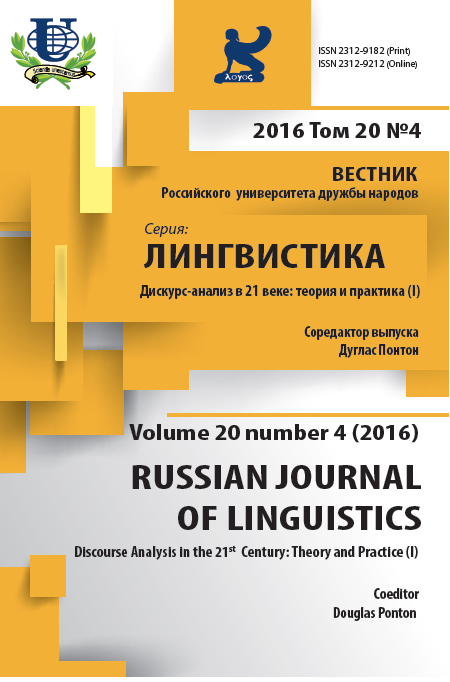American Political Discourse: Irony in Pre-Election Campaign 2016
- Authors: Gornostayeva A.A1
-
Affiliations:
- Moscow State Linguistic University
- Issue: Vol 20, No 4 (2016): Discourse Analysis in the 21st Century: Theory and Practice (I)
- Pages: 179-196
- Section: Articles
- URL: https://journals.rudn.ru/linguistics/article/view/15155
- DOI: https://doi.org/10.22363/2687-0088-15155
- ID: 15155
Cite item
Full Text
Abstract
This article represents the analysis of American modern political discourse, mainly the field connected with the pre-election campaign 2016. It explores primary genres of political discourse (speeches, announcements, debates, party programmes), as well as secondary genres (commentaries, discussions, interpretation, political interviews). Owing to the fact that political communication embraces the whole range of informal political processes in society, the field of research includes the so-called informal political socializing. The aim of the paper is to study the use of irony and its functions in political discourse. The data used for the study were taken from candidates’ speeches, interviews with political and public figures, and recent witty sayings/comments. The study is based on the theory of critical discourse analysis (M. Bilig 2007, Teun A. van Dijk 2009, N. Fairclough 1996, P. Graham 2007, J. Lemke 2007, S. Scollon 2007), political discourse analysis (A. Beard 2001, D. Ponton 2011 etc.) and theory of irony (L. Alba-Juez 2014, S. Attardo 2007, R. Giora 2001, 2003, L. Hutcheon 2005, B. Komlosi 2010 etc.). The analysis showed that irony is a frequent communicative strategy used by politicians in pre-election campaigns, it performs different functions, such as aggression, defense, entertainment and some others and plays a positive role in commucation with the audience. When used expertly, irony contributes to making political discourse more expressive and convincing. An ironic politician is a better manipulator of public opinion than one unable to use irony.
Keywords
About the authors
Anna A Gornostayeva
Moscow State Linguistic University
Email: anngornostaeva@yandex.ru
38 Ostozhenka str., 119034, Moscow, Russia
References
- Alba-Juez L. (1995) Irony and the other off record strategies within politeness theory. Miscelanea 16, 13-23
- Alba-Juez L. (2014) Irony as inferred contradiction // Russian Journal of Linguistics 4, 139-152
- Attardo S. (2007) Irony as a Relevant Inappropriateness // Irony in Language and Thought. A Cognitive Science Reader. Ed. by H.L. Colston and R.W. Gibbs. New York, London: Lawrence Erlbaum Associates, 135-172
- Beard A. (2001) The language of politics. Taylor & Francis e-Library
- Billig M. (2007) Critical Discourse Analysis and the Rhetoric of Critique // Critical Discourse Analysis: Theory and Interdisciplinarity. Palgrave Macmillan, 35-47
- Crystal D. (1995) The Cambridge Encyclopedia of the English Language / D. Crystal. Cambridge: CUP
- Fairclough N. (1996) Language and power. Longman
- Fialkova L., Yelenevskaya M. (2013) In Search of the Self: Reconciling the Past and the present in Immigrants’ Experience. Tartu ELM Scholarly Press
- Gornostaeva A.A. (2013) Irony as a component of the English communication style. [Ironia kak component angliiskogo stilya kommunikatsii]. Moscow, Maska. 240 p. [in Russian]
- Giora R. (2001) Irony and its discontent // Utrecht publications in general and comparative literature. Vol. 35. John Benjamins publishing company. Amsterdam, Philadelphia, 165-185
- Giora R. (2003) On our mind: Salience, context, and figurative language. New York: Oxford University Press
- Graham P. (2007) Critical Discourse Analysis and Evaluative Meaning: Interdisciplinarity as a Critical Turn // Critical Discourse Analysis: Theory and Interdisciplinarity. Palgrave Macmillan, 110-130
- Gouveia Carlos A.M. (2007) Critical Discourse Analysis and the Development of the New Science // Critical Discourse Analysis: Theory and Interdisciplinarity. Palgrave. Macmillan, 47-63
- Hutcheon L. (2005) Irony’s Edge. The Theory and Politics of Irony / L. Hutcheon. New York: Routledge
- Komlósi B. (2010) Irony in the semantics-pragmatics interface: A reconstructional model. November 11. [http://www.eotvos.u-szeged.hu/~vozparag/komlosi_irony.pdf]
- Lemke J. (2007) Texts and Discourses in the Technologies of Social Organization // Critical Discourse Analysis: Theory and Interdisciplinarity. Palgrave Macmillan, 130-150
- Lewis P. (2006) Cracking up: American humour in a time of conflict. The University of Chicago Press
- Martin J.R., White P.R.R. (2005) The Language of Evaluation. Appraisal in English. Palgrave Macmillan New York, N.Y. 278 p
- Ponton D.M. (2011) For Arguments’ sake: speaker evaluation in modern political discourse. Cambridge Scholars Publishing. 110 p
- Schutz C.E. (1977) Political humour from Aristophanes to San Ervin. Assossiated University presses, London 1977
- [https://books.google.com.tr/books?id=Q7i40PY6AzgC&printsec=frontcover&hl=tr&source=gbs_ge_summary_r&cad=0#v=onepage&q&f=false]
- Scollon S. (2007) Political and Somatic Alignment: Habitus, Ideology and Social Practice // Critical Discourse Analysis: Theory and Interdisciplinarity. Palgrave Macmillan, 167-199
- Van Dijk Teun A. (2009) Society and discourse: how social contexts influence text and talk. Cambridge University Press, 2009. 299 p
Supplementary files















